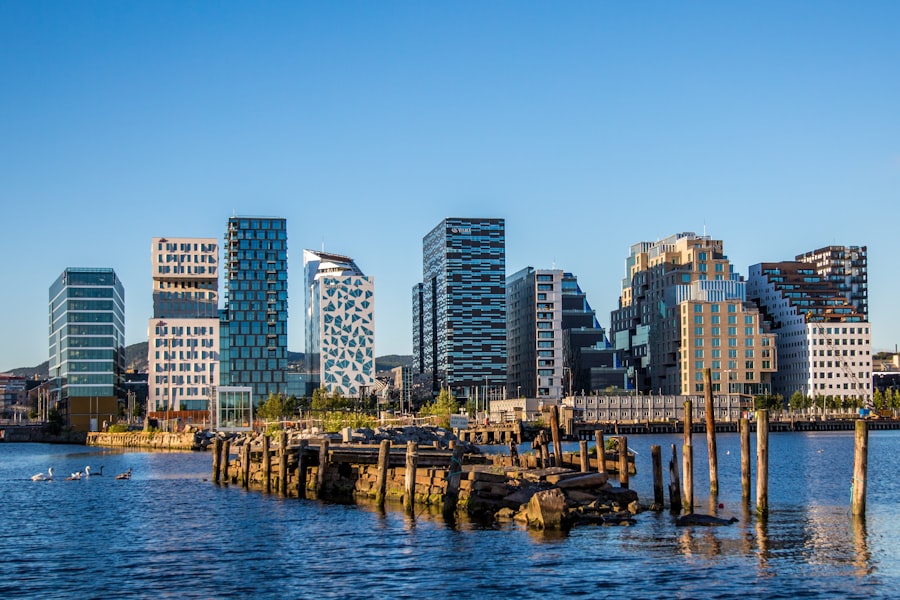The Norwegian mortgage market is a unique landscape that reflects the country’s robust economy and high standard of living. With a strong emphasis on home ownership, Norway has developed a mortgage system that caters to both locals and expatriates. The market is characterised by a variety of lending institutions, including banks, credit unions, and other financial entities, all of which offer a range of mortgage products tailored to meet diverse needs.
The competitive nature of the market means that borrowers can often find favourable terms, but it also necessitates a thorough understanding of the options available. In Norway, mortgages are typically structured as long-term loans with fixed or variable interest rates. The fixed-rate mortgages provide stability in monthly payments, while variable-rate options can offer lower initial rates but come with the risk of fluctuations over time.
Additionally, the Norwegian government has implemented regulations to ensure responsible lending practices, which helps protect both lenders and borrowers. This regulatory framework is particularly beneficial for expatriates who may be unfamiliar with the local market dynamics. Take the first step. Book a consultation with the Norway Relocation Group for your move to Norway.
Summary
- The Norwegian mortgage market is highly regulated and offers a variety of mortgage products to suit different needs.
- Expats in Norway can choose from fixed-rate, variable-rate, and interest-only mortgages, each with its own advantages and disadvantages.
- Expats applying for mortgages in Norway must have a valid residence permit and a stable income to be eligible for a mortgage.
- Documents required for obtaining a mortgage in Norway include proof of income, employment contract, and a credit report.
- The process of applying for a mortgage in Norway involves finding a suitable lender, submitting an application, and undergoing a credit assessment.
Types of Mortgages Available for Expats in Norway
Expats in Norway have access to several types of mortgages, each designed to accommodate different financial situations and preferences. The most common types include fixed-rate mortgages, variable-rate mortgages, and hybrid options that combine elements of both. Fixed-rate mortgages are particularly appealing for those who prefer predictability in their financial planning, as they lock in an interest rate for the duration of the loan.
This can be especially advantageous in a fluctuating economic environment. Variable-rate mortgages, on the other hand, can offer lower initial interest rates, making them an attractive option for those looking to minimise upfront costs. However, borrowers should be aware that these rates can change over time, potentially leading to higher payments in the future.
Hybrid mortgages provide a middle ground, allowing borrowers to benefit from the stability of fixed rates for an initial period before transitioning to a variable rate. This flexibility can be beneficial for expats who may not plan to stay in Norway long-term.
Eligibility Criteria for Expats Applying for Mortgages in Norway

When applying for a mortgage in Norway, expats must meet specific eligibility criteria set by lenders. Generally, these criteria include proof of income, creditworthiness, and residency status. Lenders typically require applicants to demonstrate a stable income source, which can be challenging for some expatriates who may be self-employed or on temporary contracts.
Additionally, having a good credit history is crucial; lenders will often assess an applicant’s credit score and financial behaviour in their home country. Residency status also plays a significant role in the eligibility process. While some lenders may offer mortgages to non-residents, many prefer applicants who hold a valid Norwegian residence permit.
This requirement is designed to mitigate risk and ensure that borrowers have a long-term commitment to living in Norway. Expats should be prepared to provide documentation that verifies their residency status and employment situation to enhance their chances of approval.
Documents Required for Obtaining a Mortgage in Norway
The documentation required for obtaining a mortgage in Norway can be extensive, reflecting the thoroughness of the application process. Typically, expats will need to provide proof of identity, such as a passport or national ID card, along with documentation that verifies their residency status in Norway. Additionally, lenders will require evidence of income, which may include payslips, tax returns, or bank statements that demonstrate financial stability.
Furthermore, expats should be prepared to submit information regarding their existing debts and financial obligations. This may involve providing details about any loans or credit cards held in their home country or elsewhere. Lenders use this information to assess an applicant’s overall financial health and ability to repay the mortgage.
It is advisable for expats to gather all necessary documents before initiating the application process to streamline their experience.
The Process of Applying for a Mortgage in Norway
The mortgage application process in Norway typically begins with an initial consultation with a lender or mortgage broker. During this meeting, expats can discuss their financial situation and explore the various mortgage options available to them. It is essential to ask questions and clarify any uncertainties regarding terms and conditions before proceeding further.
Once a suitable mortgage product is identified, the next step involves submitting the required documentation. After submitting the application and supporting documents, lenders will conduct a thorough assessment of the applicant’s financial situation. This process may take several weeks, during which the lender will evaluate creditworthiness and verify income sources.
Once approved, borrowers will receive a formal offer detailing the terms of the mortgage, including interest rates and repayment schedules. It is crucial for expats to review this offer carefully before accepting it, as it will outline their obligations as borrowers.
Factors to Consider When Choosing a Mortgage in Norway

When selecting a mortgage in Norway, expats should consider several key factors that can significantly impact their financial future. One of the most critical aspects is the type of interest rate—fixed or variable—since this decision will influence monthly payments and overall loan costs. Fixed-rate mortgages provide stability but may come with higher initial rates compared to variable options that can fluctuate based on market conditions.
Another important consideration is the loan-to-value (LTV) ratio, which represents the percentage of the property’s value that is financed through the mortgage. A lower LTV ratio typically results in better interest rates and terms; therefore, expats should aim to make a substantial down payment if possible. Additionally, it is essential to evaluate the total cost of borrowing over the life of the loan, including any fees or additional charges associated with the mortgage.
Interest Rates and Repayment Options for Mortgages in Norway
Interest rates on mortgages in Norway can vary significantly based on market conditions and individual borrower profiles. Generally, fixed-rate mortgages tend to have higher interest rates than variable-rate options due to their stability over time. However, borrowers should consider their long-term plans when choosing between these options; those who anticipate staying in Norway for an extended period may benefit from locking in a fixed rate.
Repayment options also play a crucial role in determining the overall affordability of a mortgage. Most lenders offer various repayment plans, including interest-only options or amortising loans where both principal and interest are paid over time. Expats should carefully assess their financial situation and choose a repayment plan that aligns with their budget and lifestyle preferences.
Additional Costs and Fees Associated with Mortgages in Norway
In addition to monthly mortgage payments, expats should be aware of various additional costs and fees associated with obtaining a mortgage in Norway. These may include arrangement fees charged by lenders for processing the application, valuation fees for assessing the property’s worth, and legal fees for completing necessary paperwork. It is essential to factor these costs into the overall budget when considering home ownership.
Moreover, expats should also account for ongoing expenses such as property taxes and insurance premiums. Property taxes in Norway can vary depending on location and property value; therefore, it is advisable to research local tax rates before making a purchase decision. Home insurance is another critical consideration that protects against potential damages or losses; lenders often require borrowers to have adequate coverage before finalising the mortgage agreement.
Legal and Regulatory Aspects of Mortgages for Expats in Norway
Navigating the legal and regulatory landscape surrounding mortgages in Norway can be complex for expatriates unfamiliar with local laws. The Norwegian government has established strict regulations governing lending practices to ensure consumer protection and promote responsible borrowing. These regulations require lenders to conduct thorough assessments of applicants’ financial situations before approving loans.
Expats should also be aware of their rights as borrowers under Norwegian law. This includes understanding the terms of their mortgage agreements and knowing what recourse they have in case of disputes with lenders. Engaging with legal professionals who specialise in property law can provide valuable insights and guidance throughout the mortgage process.
Tips for Expats to Improve their Chances of Getting a Mortgage in Norway
For expatriates seeking mortgages in Norway, there are several strategies they can employ to enhance their chances of approval. Firstly, maintaining a strong credit profile is essential; this may involve paying off existing debts and ensuring timely payments on any financial obligations. Additionally, having a substantial down payment can significantly improve an applicant’s position by reducing the loan-to-value ratio.
Building relationships with local banks or mortgage brokers can also be beneficial; these professionals often have insights into specific lender requirements and can provide tailored advice based on individual circumstances. Furthermore, being transparent about financial situations during the application process fosters trust with lenders and increases the likelihood of securing favourable terms.
Resources and Support for Expats Seeking Mortgages in Norway
Expats looking for support during their mortgage journey in Norway have access to various resources designed to assist them through every step of the process. Local banks often provide dedicated services for expatriates, offering tailored advice and products that cater specifically to their needs. Additionally, online platforms provide valuable information about current market trends and mortgage options available.
Furthermore, organisations such as expat communities or forums can serve as excellent sources of information where individuals share experiences and recommendations regarding lenders and mortgage products. For those seeking language support or cultural integration assistance while navigating these processes, enrolling in Norwegian courses at institutions like the NLS Norwegian Language School in Oslo can be immensely beneficial. These courses not only enhance language skills but also foster a deeper understanding of Norwegian culture and business practices—an invaluable asset when dealing with financial institutions in Norway.
In conclusion, while obtaining a mortgage as an expat in Norway may present challenges due to differing regulations and requirements compared to one’s home country, understanding the local market dynamics and preparing adequately can lead to successful outcomes. By leveraging available resources and support systems—such as language courses at NLS Norwegian Language School—expats can navigate this complex landscape with greater confidence and ease.
Learn more about the Norwegian classes at the NLS Norwegian Language School in Oslo

